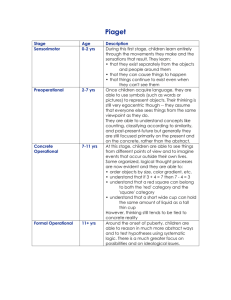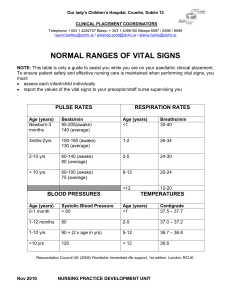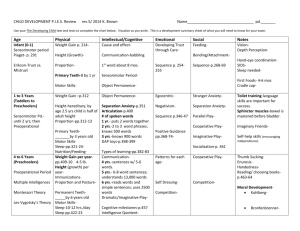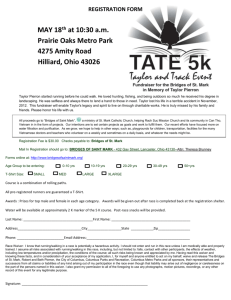Recommendations for the Retention of Pharmacy Records
advertisement
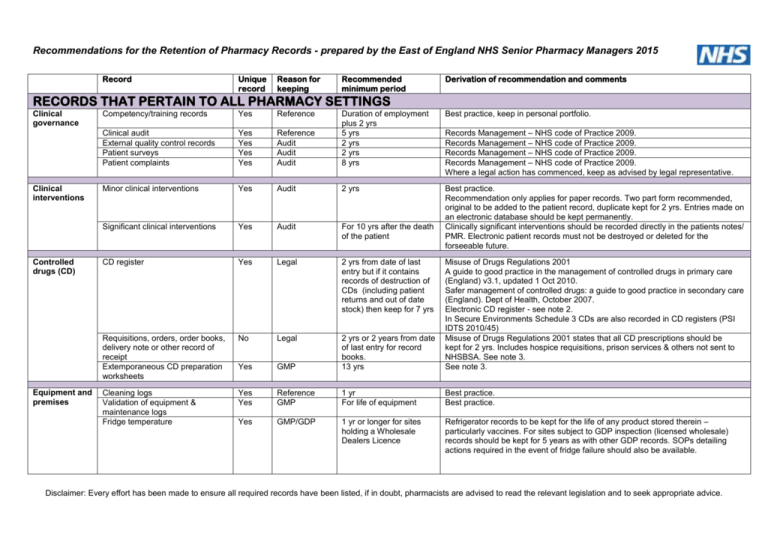
Recommendations for the Retention of Pharmacy Records - prepared by the East of England NHS Senior Pharmacy Managers 2015 Record Unique record Reason for keeping Recommended minimum period Derivation of recommendation and comments RECORDS THAT PERTAIN TO ALL PHARMACY SETTINGS Clinical governance Clinical interventions Controlled drugs (CD) Equipment and premises Competency/training records Yes Reference Best practice, keep in personal portfolio. Reference Audit Audit Audit Duration of employment plus 2 yrs 5 yrs 2 yrs 2 yrs 8 yrs Clinical audit External quality control records Patient surveys Patient complaints Yes Yes Yes Yes Minor clinical interventions Yes Audit 2 yrs Significant clinical interventions Yes Audit For 10 yrs after the death of the patient Best practice. Recommendation only applies for paper records. Two part form recommended, original to be added to the patient record, duplicate kept for 2 yrs. Entries made on an electronic database should be kept permanently. Clinically significant interventions should be recorded directly in the patients notes/ PMR. Electronic patient records must not be destroyed or deleted for the forseeable future. CD register Yes Legal 2 yrs from date of last entry but if it contains records of destruction of CDs (including patient returns and out of date stock) then keep for 7 yrs Requisitions, orders, order books, delivery note or other record of receipt Extemporaneous CD preparation worksheets No Legal Yes GMP 2 yrs or 2 years from date of last entry for record books. 13 yrs Misuse of Drugs Regulations 2001 A guide to good practice in the management of controlled drugs in primary care (England) v3.1, updated 1 Oct 2010. Safer management of controlled drugs: a guide to good practice in secondary care (England). Dept of Health, October 2007. Electronic CD register - see note 2. In Secure Environments Schedule 3 CDs are also recorded in CD registers (PSI IDTS 2010/45) Misuse of Drugs Regulations 2001 states that all CD prescriptions should be kept for 2 yrs. Includes hospice requisitions, prison services & others not sent to NHSBSA. See note 3. See note 3. Cleaning logs Validation of equipment & maintenance logs Fridge temperature Yes Yes Reference GMP 1 yr For life of equipment Best practice. Best practice. Yes GMP/GDP 1 yr or longer for sites holding a Wholesale Dealers Licence Refrigerator records to be kept for the life of any product stored therein – particularly vaccines. For sites subject to GDP inspection (licensed wholesale) records should be kept for 5 years as with other GDP records. SOPs detailing actions required in the event of fridge failure should also be available. Records Management – NHS code of Practice 2009. Records Management – NHS code of Practice 2009. Records Management – NHS code of Practice 2009. Records Management – NHS code of Practice 2009. Where a legal action has commenced, keep as advised by legal representative. Disclaimer: Every effort has been made to ensure all required records have been listed, if in doubt, pharmacists are advised to read the relevant legislation and to seek appropriate advice. Record Patient safety incidents Dispensing error records/incidents & associated stats Dispensing incidents – serious incidents resulting in disability or death Unique record Yes Reason for keeping Audit Recommended minimum period 1 yr plus current Yes Legal 30 yrs Derivation of recommendation and comments Recommendations only apply to paper records, entries made on electronic databases should be kept permanently. Records Management – NHS code of Practice 2009. Recalls/drug alerts Recall documentation Yes Audit 5 yrs Recommendations from the Good Distribution Guide - especially for those with wholesale dealers licence. Responsible pharmacist Responsible pharmacist records/log book Yes Legal At least 5 yrs Can be in hard copy or electronic. Medicines (pharmacies/responsible pharmacist) Regulations 2008 (SI 2008/2789). Superceded documents Superceded SOPs Superceded Patient Group Directions (PGDs) No No Reference Reference 15 yrs 8 yrs for adult and 25 yrs for child (0-18 yrs) or for 8 yrs after a child’s death Best practice. As electronic record in perpetuity. Best practice. Stock handling and transfer Picking tickets/delivery notes Old order books Invoices Wholesale dealing records Yes No Yes Yes Uncertain Audit Legal GDP 3 months 2 yrs 6 complete tax yrs 5 yrs A "reasonable" period of time - for verification of order only. Current financial yr plus 1. Limitation Act 1980. See note 4. EU Guide on Good Distribution Practice (part of the Orange Guide). Waste medicines Destruction of patients' own drugs (excluding controlled drugs) Yes Audit 6 months Waste - Non-hazardous Transfer notes Waste - hazardous Consignment notes Yes Legal 2 yrs Yes Legal 3 yrs Revised Duthie Report (2005) states that patient's own drugs are the property of the patient and should only be destroyed with the patient's permission. If medicines are removed from a patient’s home during a domiciliary visit, record what is destroyed. Safe management of healthcare waste (version 2.0), Dept of Health & Environment Agency, 2012. Safe management of healthcare waste (version 2.0), Dept of Health & Environment Agency, 2012. HOSPITAL PHARMACY SPECIFIC RECORDS (also applicable to Secure Environments - see Note 8) Clinical Trial IMP batch production records Protocols Dispensing records Destruction records Yes Yes Yes Yes GMP/GCP Reference Reference GMP 5 yrs after end of the trial 5 yrs after end of the trial 5 yrs after end of the trial 5 yrs after end of the trial Preparation or dispensing of ATMPs CD clinical trials information Clinical drug trials or other studies outwith the Clinical Trials Directive Yes Reference 30 yrs Yes Yes GMP GCP / Against future claims 5 yrs 5 yrs after end of the trial Article 9 of Directive 2003/94/EC. See note 1. The sponsor of the trial is responsible for the destruction of unused and/or returned trial material. Therefore any destruction must be authorized in writing and a dated destruction certificate supplied to the sponsor. ATMP = Advanced Therapeutic Medicinal Products. This may be longer for some trials. For example - metabolic studies, nutritional studies. Article 17 of Directive 2005/28/EC for Clinical trials, otherwise good practice. Disclaimer: Every effort has been made to ensure all required records have been listed, if in doubt, pharmacists are advised to read the relevant legislation and to seek appropriate advice. Record Unique record No Reason for keeping Legal Recommended minimum period 2 yrs Copy of signature for CD ward order or requisition Yes Validation Duration of employment CD record book (ward/theatre based) Yes Audit Aseptic CD worksheets - adult paediatric CD clinical trials information Destruction of patients' own CDs Yes Yes Yes Yes GMP GMP GMP Audit 2 yrs from date of last entry but if it contains records of destruction of CDs (including patient returns and out of date stock) then keep for 7 yrs 13 yrs 26 yrs 5 yrs 7 yrs CD prescriptions (Both inpatient and outpatient) Yes Legal 2 yrs Medicines Information Question asked, information search & answer Yes Reference and audit 8 yrs (25 yrs for child, obstetrics and mental health enquiries) Recommendations apply to previous paper based enquiry forms. [UKMI National Standard for MI services, March 2009]. Electronic enquiry database (MIDatabank) should be kept permanently. Miscellaneous Doctors/nurses signatures Yes Reference Destroy 1 yr after termination of employment (not referenced, best practice). Self administration records Superceded IV drug administration monographs MR documentation Drug & Therapeutics Committee agendas, letters, minutes, drug submissions, etc. No No Reference Reference Duration of contract + 1 yr Not required 10 yrs Yes No Audit Reference 2 yrs 30 yrs As electronic record in perpetuity. See note 5. Dept of Health. Records Management: NHS Code of Practice, Part 2. Jan 2009. To take out (TTO) prescriptions Out-patient prescriptions Private prescriptions No No Yes Audit Audit Audit 2 yrs 2 yrs 2 yrs Unlicensed medicines dispensing record Parenteral nutrition (PN) Chemotherapy prescriptions Yes Legal 5 yrs EPR will eventually hold all details - duplication of record held in notes, see note 5. EPR will eventually hold all details - duplication of record held in notes, see note 5. According to RPSGB ethics guide this is the minimum requirement. (Secure Environments see Note 8) Requirement of Guidance Note 14. Permanent record of batch details kept. No No Audit Reference 2 yrs 2 yrs after last chemo treatment Controlled Drugs Prescriptions CD ward orders or requisitions Derivation of recommendation and comments Misuse of Drugs Regulations 2001 states that all CD prescriptions should be kept for 2 yrs. Keep in original paper form or computerised form. Copy of signature of each authorized signatory should be available in the pharmacy department. Safer Management of Controlled Drugs – A guide to good practice in secondary care (England), Oct 2007. Safer Management of Controlled Drugs – A guide to good practice in secondary care (England), Oct 2007. See note 2. See note 3. This may be longer for some trials. Revised Duthie Report (2005) states that patient's own drugs are the property of the patient and should only be destroyed with the patient's permission. Misuse of Drugs Regulations 2001 states that all CD prescriptions should be kept for 2 yrs. (Secure Environments see Note 9) Will be kept in nursing notes/main medical record. - Original valid prescription should be kept in patient's notes. EPR will eventually hold all details - duplication of record held in notes. Disclaimer: Every effort has been made to ensure all required records have been listed, if in doubt, pharmacists are advised to read the relevant legislation and to seek appropriate advice. Record Unique record Yes Reason for keeping GCP / Against future claims Recommended minimum period 5 yrs after end of the trial Derivation of recommendation and comments Yes Reference 30 yrs To allow full traceability of all blood products use. Order & delivery notes No Audit/GDP 2 yrs or 5yrs Ward stock order sheets Ward pharmacy requests Ad hoc forms (e.g. dispensing request forms to stores) Yes No No Audit Uncertain Uncertain 2 yrs 1 yr 3 months Current financial yr plus 1. See note 4. For Wholesaler Dealers EU Guide on Good Distribution Practice requires retention of all records for 5yrs. Current financial yr plus 1. Record of what was requested by ward pharmacist - unlikely benefit after 12 mths. Reasonable period and current practice. Stock Control Stock check lists Yes Audit 1 yr plus current As in HSC 1999/053. Technical services Any Quality Control (QC) documentation including certificates of analysis Environmental monitoring results Yes GMP 5 yrs or 1 yr after expiry date of batch Whichever is the longer, (Article 51(3) of Directive 2001/83). Yes GMP As electronic record in perpetuity. Validation/training of operators Yes GMP Paediatric products worksheets Chemotherapy/aseptic worksheets PN worksheets Resuscitation box worksheet Yes Yes GMP GMP 1 yr after expiry dates of products Duration of employment + 5 yrs after leaving At least 5 yrs 5 yrs No Yes GMP GMP Batch production records Extemporaneous dispensing records Raw material request; packaging and control forms Yes Yes GMP Product liability GMP 5 yrs 1 yr after expiry of longest dated item 5 yrs 5 yrs Product liability extends this to 11 yrs after expiry. If sold or supplied across a legal boundary 5 yrs or 1 yr after expiry date of batch as per GMP. Product liability extends this to 11 yrs after expiry. Product liability extends this to 11 yrs after expiry. At least 5 yrs Part of batch record, so product liability issues apply (extends to 11 yrs after expiry). Any unlicensed medicines (ULM) documentation Yes 5 yrs Not a specific requirement of Guidance note 14, it would be best practice to keep a permanent batch specific record of the assessment of the ULM purchased. For 10 yrs after the death of the patient 2 yrs 2 yrs from last entry At least 5 yrs Records Management – NHS code of Practice 2009. Electronic patient records must not be destroyed or deleted for the forseeable future. The Human Medicines Regulations 2012 (regulation 253 (5)) The Human Medicines Regulations 2012 (regulation 253 (5)) Veterinary medicines regulations 2009 (SI 2297) Must keep all documents relating to the transaction. Specific requirements for what information must be included. Prescriptions cont. Purchase Orders Unlicensed medicines Clinical drugs trials or other studies outwith the Clinical Trials Directive Immunoglobulins/blood products Yes Legal/Against future claims For example - metabolic studies, nutritional studies. Article 17 of Directive 2005/28/EC for Clinical trials, otherwise good practice. Keep in personal portfolios. Product liability extends to up to 28 yrs. See note 6. Product liability extends this to 11 yrs after expiry. COMMUNITY PHARMACY SPECIFIC RECORDS Dispensing PMR Yes Legal Private prescriptions POM register POM-V & POM-VPS records of receipt and supply Yes No Yes Legal Legal Legal Disclaimer: Every effort has been made to ensure all required records have been listed, if in doubt, pharmacists are advised to read the relevant legislation and to seek appropriate advice. Record Unique record Reason for keeping Recommended minimum period Derivation of recommendation and comments EPS2 Patient pharmacy nomination Yes Audit 6 mths after the last prescription the collected Best practice. This also applies to patient authorisations for managed repeat systems. Specials and unlicensed medicines Extemporaneously prepared on the premises with internal quality control. Extemporaneously prepared by another pharmacy/company with external quality control Unlicensed imports Yes Legal 5 yrs No Legal 5 yrs No Legal 5 yrs The Human Medicines Regulations 2012 (regulation 170). Product liability extends this to 11 yrs after expiry for adults and up to 28 yrs for children. See note 4. The Human Medicines Regulations 2012 (regulation 170). Should have the certificate of conformity including the source of the product; to whom, and the date on which the product was sold or supplied; the prescriber’s details; the quantity of each sale or supply; the batch number of the product; details of any adverse reactions to the product sold or supplied. See note 4. DDA / Equality Act Record of assessment and outcome of patients needs in respect of medicines Yes Reference Minimum 1 yr Best practice Assessment should be repeated if patient circumstances change. Public Health Campaigns Evidence of participation in local public health campaigns Yes Reference 2 yrs Where requested by the commissioner to do so, records should be kept to evidence compliance with Terms of service of Pharmacists – Schedule 4, part 2, para 18 (b) to regulation 11(1)(a)(i) of the National Health Service (Pharmaceutical and Local Pharmaceutical Services) Regulations 2013. Advanced services MUR records Yes Legal 2 yrs Records can be kept in electronically or in hard copy. The Pharmaceutical Services (Advanced and Enhanced Services) (England) Directions 2013 require pharmacies to keep copies of the MUR consultation record for at least two years after the date on which the consultation to which the record relates is carried out (Direction 5(1)(l)). New medicine service forms Yes Legal 2 yrs Records can be kept in electronically or in hard copy. The Pharmaceutical Services (Advanced and Enhanced Services) (England) Directions 2013 require pharmacies to keep copies of the NMS consultation records for at least two years after the date on which the service intervention is completed or discontinued (Direction 7(1)(n)). Stoma appliance customisation Yes Legal 12 months Records can be kept in electronically or in hard copy. The Pharmaceutical Services (Advanced and Enhanced Services) (England) Directions 2013 require pharmacies to keep records of each stoma customisation for at least 12 months or such longer period as the commissioner may reasonably require (Direction 10(2)(d)). Appliance use review Yes Legal 12 months Records can be kept in electronically or in hard copy. The Pharmaceutical Services (Advanced and Enhanced Services) (England) Directions 2013 require pharmacies to keep records of each AUR for at least 12 months or such longer period as the commissioner may reasonably require (Direction 12(5)(e)). Disclaimer: Every effort has been made to ensure all required records have been listed, if in doubt, pharmacists are advised to read the relevant legislation and to seek appropriate advice. Record No Reference Smoking cessation service Supply of Smoking cessation therapy (not via FP10) e.g. NRT Supply of Smoking cessation therapy via PGD Minor ailments service Immunisation and vaccination records Yes Yes Audit Audit Recommended minimum period For adults aged 18 and over: 10 yrs For a child: until the 25th birthday or 10 yrs (whichever is longer) Where individual patient records are kept by a sexual health team and a shorter minimum period for retaining records may be stated in the service level agreement. 2 yrs 2 yrs Yes Audit 2 yrs Records Management – NHS code of Practice 2009. Yes Yes Audit Audit Recommended best practice. Records Management – NHS code of Practice 2009 NHS health check No* Audit 2 yrs Retain until the patient’s 25th birthday or 26th if the young person was 17yrs old at conclusion of treatment. All others retain for 10 yrs after conclusion of treatment. 2 yrs NHS health check Yes** Audit 2 yrs Substance misuse service forms Yes Audit 2 yrs Invoices and consent forms All payment claims, invoices and patient consent forms relating to any advanced or enhanced service Yes Audit 6 complete tax years VAT regulations 2005 for invoices. Individual signed consent forms support the invoiced claim. NOTE: Enhanced service consent forms represent consent at the point in time the service is provided and are not proof of ongoing consent. Other records Any other records pertaining to individual patient care in community pharmacy, not covered elsewhere in this document. Yes Audit 2yrs Best practice. This recommendation only applies for paper records, it is accepted that, where appropriate, records relating to patient care e.g. self care, signposting, telephone queries should be entered on the PMR, either directly or transferred from paper records. Entries made on the PMR should be kept permanently. Enhanced services, locally commissioned services or private services See Note 7 Sexual Health service forms Unique record Yes Reason for keeping Audit Comments Records Management – NHS code of Practice 2009 Clinical Standards Committee, Faculty of Sexual and Reproductive Healthcare (FSRH) of the Royal College of Obstetricians and Gynaecologists. NB The longest license period for a contraceptive device is 10 years. Records Management – NHS code of Practice 2009. Records Management – NHS code of Practice 2009. Best practice *If the results are forwarded to the patients GP for inclusion on the clinical record Best practice **Where results are not forwarded to the GP Recommended best practice Disclaimer: Every effort has been made to ensure all required records have been listed, if in doubt, pharmacists are advised to read the relevant legislation and to seek appropriate advice. GMP = good manufacturing practice; GDP = good distribution practice; GCP = good clinical practice; MR = medicines reconciliation; MUR = medicines use review Where GMP is given as the reason for keeping the record, this would be legally enforceable for all unlicensed medicines and for any manufacturing of medicines under an MHRA licence. Any reason for keeping other than ‘legal’ can be regarded as best practice. Note 1 The sponsor of the trial is responsible under current legislation for keeping trial records. All clinical trial records should be retained for a longer (up to 15 years) if required by the applicable regulatory requirement(s) or if needed by the Sponsor as per Annex 1 to Directive 2001/83/EC and GCP requirements CPMP/ICH/135/95. Note 2 Once electronic CD registers are in widespread use, the Government intends to require anyone required to keep secure copies of a CD register for up to 11 years. (Department of Health. Safer management of CDs: Changes to the record keeping requirements, guidance for England only. Last revised February 2008) Note 3 Every requisition, order or private prescription on which a CD is supplied must be preserved by the pharmacy department for a minimum of 2 years from the date on which the last delivery under it was made. Although the mandatory period for keeping requisitions is 2 years, health care organizations may wish to store them for longer periods, as cases often come to court at a much later date. Future regulations may increase the period of time for the storage of records. (Department of Health/RPSGB, Safer management of controlled drugs – a guide to good practice in secondary care. (England) Oct 2007) Note 4 Either delivery notes or invoices should be kept for 11 years as product liability records. Note 5 EPR must not be destroyed or deleted for the foreseeable future. (Department of Health. Records Management: NHS Code of Practice, Part 2. Jan 2009) Note 6 Consumer Protection Act 1987 allows patients to claim up to 10 years after a medicine has been administered (in paediatrics up to 28 years - maturity plus 10 years). If adequate records are available in the patient's notes, the records should only need to be kept for the period stated under the recommendation. Note 7 For locally negotiated services, if the minimum retention period stated in the contractual arrangement of the service level agreement (SLA) exceeds the recommendations of this document contractors must adhere to the SLA. Note 8 NHS England directly commissions healthcare in all residential Secure Environments (prisons, Immigration Removal Centres and Secure Training Centres). Prescriptions generated in these settings are therefore NHS prescriptions and not private prescriptions. The expectations for prescriptions and other record retention for these settings are in the main as for hospital settings. A wing or treatment room is considered equivalent to a hospital ward . (NPC 2009 A Guide to Good Practice in the Management of Controlled Drugs in Primary Care). The community pharmacy section of this document is relevant where Advanced services or additional enhanced services are commissioned. Note 9 In addition to retaining the CD prescription a copy of the current CD prescription (i.e. Schedule 2 and 3) for a patient should be available on patient transfer to another secure setting. To achieve this either a scanned e-copy or a hard copy transferred with the patient is needed. This is essential for enabling continuity of supply on transfer until the prescription is reviewed. (PSI IDTS 2010/45) and Best Practice. Prepared by Katie Smith, Director, East Anglia Medicines Information Service on behalf of the East of England Senior Pharmacy Managers Network; with special thanks to Rob Lowe, Quality Assurance Specialist Services, East of England and Northamptonshire; Tim Root, Clinical Governance & Technical Services, East & South East England Specialist Pharmacy Services; Denise Farmer, Pharmaceutical Adviser Health and Justice Commissioning, NHS England (Central and East Anglia Area Team); Paula Wilkinson, Chief Pharmacist & Primary Care Lead, Mid Essex Clinical Commissioning Group & Jane Newman, Pharmacy LPN Chair Essex, March 2015. If you have any comments or feedback, please contact Katie Smith – 01473 704431, Katie.smith@ipswichhospital.nhs.uk Disclaimer: Every effort has been made to ensure all required records have been listed, if in doubt, pharmacists are advised to read the relevant legislation and to seek appropriate advice.
